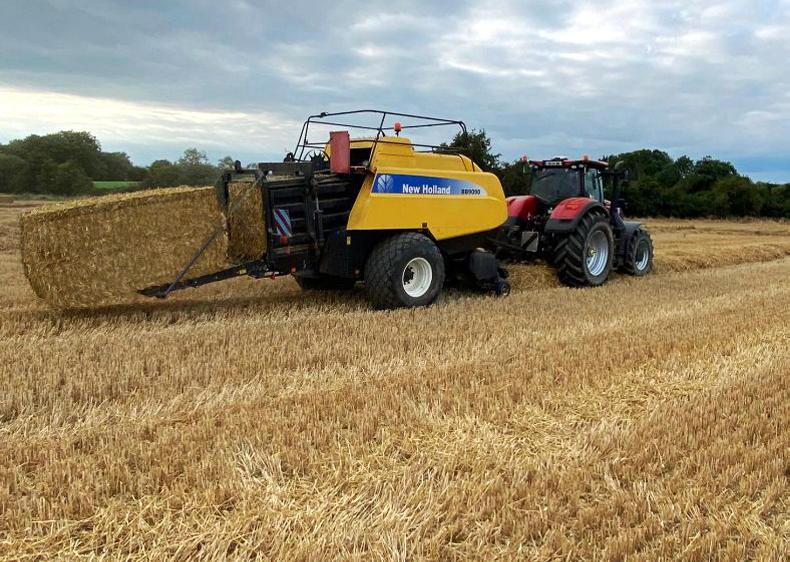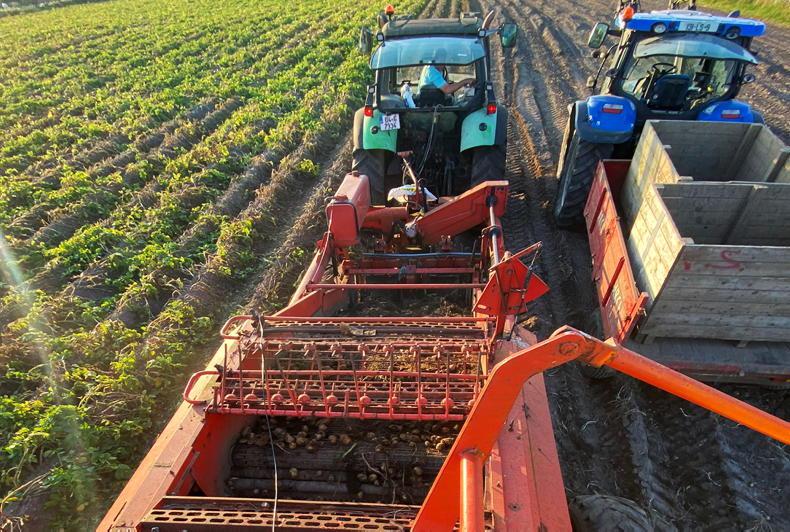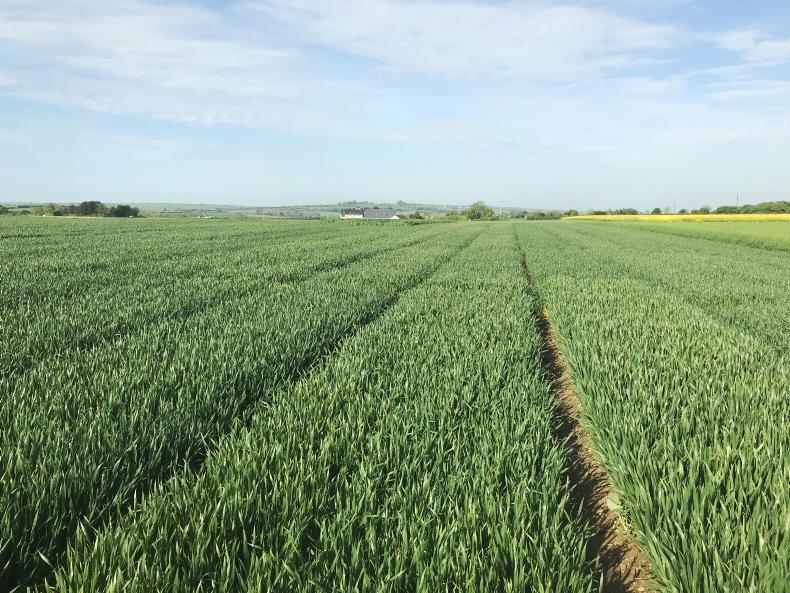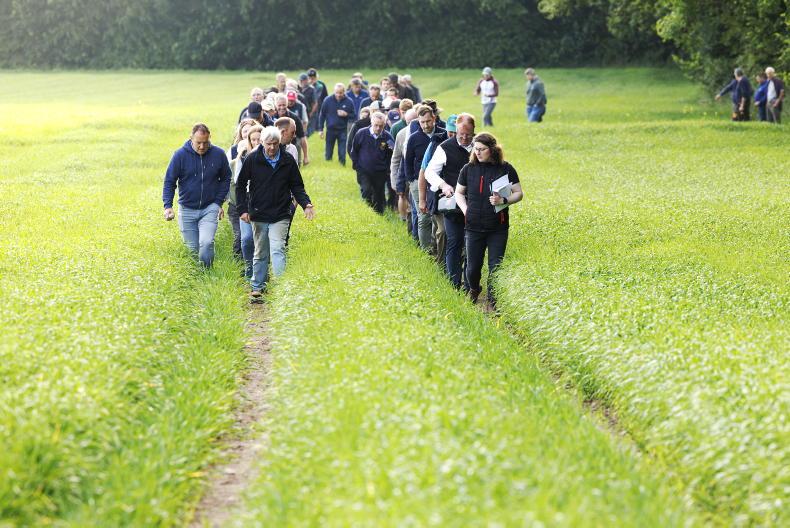Michael Kennedy –
Athenry,
Co Galway
“Weather is everything” is how Michael Kennedy opened our conversation earlier this week.
“It made a good growing year and then it made getting the work done easier.
“We don’t often get it easy over here in the west, but this was a good one.”
Michael was down to the last few acres of spring barley early this week, much earlier than he might normally expect to be finished and he hopes it will all be wrapped up by Wednesday.
His yields ranged from 3.1-3.9t/ac
Michael reported that this has been a good year of spring barley yields for many in the west. His yields ranged from 3.1-3.9t/ac and he expects his average yield will be on the upper side of 3.5t/ac. This was mainly delivered at between 15% and 18% moisture, with specific weights around 63-64KPH.
He had two varieties – RGT Planet and SY Arderin. Both produced similar yields and both went down in heavy rain a few weeks prior to harvest.
But they did not go flat and were relatively easy to harvest. However, the lodging meant that crows and pigeons were a serious issue for a few weeks.
Other crops
His spring oats were less exceptional at 3.1t/ac, but Michael was happy with anything over 3t/ac. In addition, the average moisture was 15%. Straw yield was even bigger at 12-13 bales per acre, but oaten straw was more difficult to move.
He is now digging British Queen potatoes for the local market. They have bulked up to around 12t/ac and the price is holding up well.
Once all the grain is harvested and straw is removed, the other big job is to get his brassica catch crop mix sown. Michael needs to plant 32ac to meet his EFA requirement under greening.
Brendan Lynch –
Ardee,
Co Louth
Brendan Lynch was very at ease when I spoke with him earlier this week. He completed his cereal harvest last week and is now tidying up straw and other jobs to wrap up harvest 2021 – except for the potatoes that is. They are about another month away and are looking good.
He was very happy with his 380ac of winter wheat.

Brendan Lynch baling up the last of the wheaten straw recently.
This was all first wheat after a break, a rotational slot that showed its advantage around the country this year. Brendan reckons that he will average on the strong side of 4.5t/ac. All the grain is now on air in store and will be sold as conditioned rather than dry grain.
All grain quality was excellent
He feels that Graham was his highest-yielding variety, but he was very impressed with Costello too, when planted late after potatoes. Graham produced many of his highest yields, passing 5t/ac in some instances, while Conros was his poorest performing variety. All grain quality was excellent.
Brendan’s Husky winter oats finished up at 3.8t/ac
Wheat straw yields were good too, with up to 6.5 bales (8x4x4) per acre, but the average was around five bales. About half the wheat straw went for composting, with the other half for feeding.
Brendan’s Husky winter oats finished up at 3.8t/ac and all the oat straw (and rape) was chopped (mainly under the Straw Incorporation Measure (SIM)).
All stubbles have been cultivated once and most have already greened up with vegetation. He planted some catch crops after oilseed rape and hopes to plant a bit more later this week.
Out and in again
Brendan completed his winter rape harvest a few weeks ago and his 2022 crop is already in the ground. This was sown to DK Exstar and some of it has already been sold forward for 2022.
His 2021 crop finished up around 1.75t/ac, broadly similar to many other growers.
This was mainly cut at around 10-12% moisture. Around half of the crop had been forward sold at prices lower than they are now, but they were attractive at the time.
Seamus Duggan –
Durrow,
Co Laois
When I spoke to Seamus earlier this week, he was cutting the last of his Planet malting barley and hoped to be finished harvest 2021 on Tuesday.

Seamus Duggan working his way through the last few acres of spring malting barley in his 2021 harvest.
He commented that it was a good harvest and that crops largely performed according to the quality of the field.
This land had problems with establishment, wet, dry, or pH at different times
He expects his average yield will be just over 3t/ac, so he had yields well above and below that. Some of his poorer ground was down to 2.2t/ac, but this was better than some of it looked all year. This land had problems with establishment, wet, dry, or pH at different times.
Most of Seamus’s crops were at or above 3t/ac and the Planet he was cutting was still doing this when I spoke to him. The real thrill of the harvest was the crops that followed ley, maize and beet. They did not look anything extra special all year, but some of the yields in these exceeded 4t/ac.
You only get one chance to harvest it, so get all you can into the tank
Some crops were quite badly broken down by the time the combine arrived, so extra care was needed to minimise ear loss.
That meant travelling slowly to pull in as many heads as possible and even cutting some fields in one direction.
“You only get one chance to harvest it, so get all you can into the tank,” he commented.
Good malting barley
All his malting barley was accepted this year and Seamus said that there is strong demand locally for any surplus malting barley.
Protein levels were low in the early crops (8.1%-8.9%), but the next band came in at 9.2%-9.5% and some crops now are up to 10.5% protein.
Seamus grew some SY Tungsten this year, which averaged 3.7t/ac at 70KPH plus – very pleasing. His Laureate also did very well, but place in rotation was what made the biggest difference.
Straw yields were good, at nearly 11 bales per acre.
Additional demand around his area for barley straw for composting has mopped up straw that might not have been accounted for.
Michael Kennedy –
Athenry,
Co Galway
“Weather is everything” is how Michael Kennedy opened our conversation earlier this week.
“It made a good growing year and then it made getting the work done easier.
“We don’t often get it easy over here in the west, but this was a good one.”
Michael was down to the last few acres of spring barley early this week, much earlier than he might normally expect to be finished and he hopes it will all be wrapped up by Wednesday.
His yields ranged from 3.1-3.9t/ac
Michael reported that this has been a good year of spring barley yields for many in the west. His yields ranged from 3.1-3.9t/ac and he expects his average yield will be on the upper side of 3.5t/ac. This was mainly delivered at between 15% and 18% moisture, with specific weights around 63-64KPH.
He had two varieties – RGT Planet and SY Arderin. Both produced similar yields and both went down in heavy rain a few weeks prior to harvest.
But they did not go flat and were relatively easy to harvest. However, the lodging meant that crows and pigeons were a serious issue for a few weeks.
Other crops
His spring oats were less exceptional at 3.1t/ac, but Michael was happy with anything over 3t/ac. In addition, the average moisture was 15%. Straw yield was even bigger at 12-13 bales per acre, but oaten straw was more difficult to move.
He is now digging British Queen potatoes for the local market. They have bulked up to around 12t/ac and the price is holding up well.
Once all the grain is harvested and straw is removed, the other big job is to get his brassica catch crop mix sown. Michael needs to plant 32ac to meet his EFA requirement under greening.
Brendan Lynch –
Ardee,
Co Louth
Brendan Lynch was very at ease when I spoke with him earlier this week. He completed his cereal harvest last week and is now tidying up straw and other jobs to wrap up harvest 2021 – except for the potatoes that is. They are about another month away and are looking good.
He was very happy with his 380ac of winter wheat.

Brendan Lynch baling up the last of the wheaten straw recently.
This was all first wheat after a break, a rotational slot that showed its advantage around the country this year. Brendan reckons that he will average on the strong side of 4.5t/ac. All the grain is now on air in store and will be sold as conditioned rather than dry grain.
All grain quality was excellent
He feels that Graham was his highest-yielding variety, but he was very impressed with Costello too, when planted late after potatoes. Graham produced many of his highest yields, passing 5t/ac in some instances, while Conros was his poorest performing variety. All grain quality was excellent.
Brendan’s Husky winter oats finished up at 3.8t/ac
Wheat straw yields were good too, with up to 6.5 bales (8x4x4) per acre, but the average was around five bales. About half the wheat straw went for composting, with the other half for feeding.
Brendan’s Husky winter oats finished up at 3.8t/ac and all the oat straw (and rape) was chopped (mainly under the Straw Incorporation Measure (SIM)).
All stubbles have been cultivated once and most have already greened up with vegetation. He planted some catch crops after oilseed rape and hopes to plant a bit more later this week.
Out and in again
Brendan completed his winter rape harvest a few weeks ago and his 2022 crop is already in the ground. This was sown to DK Exstar and some of it has already been sold forward for 2022.
His 2021 crop finished up around 1.75t/ac, broadly similar to many other growers.
This was mainly cut at around 10-12% moisture. Around half of the crop had been forward sold at prices lower than they are now, but they were attractive at the time.
Seamus Duggan –
Durrow,
Co Laois
When I spoke to Seamus earlier this week, he was cutting the last of his Planet malting barley and hoped to be finished harvest 2021 on Tuesday.

Seamus Duggan working his way through the last few acres of spring malting barley in his 2021 harvest.
He commented that it was a good harvest and that crops largely performed according to the quality of the field.
This land had problems with establishment, wet, dry, or pH at different times
He expects his average yield will be just over 3t/ac, so he had yields well above and below that. Some of his poorer ground was down to 2.2t/ac, but this was better than some of it looked all year. This land had problems with establishment, wet, dry, or pH at different times.
Most of Seamus’s crops were at or above 3t/ac and the Planet he was cutting was still doing this when I spoke to him. The real thrill of the harvest was the crops that followed ley, maize and beet. They did not look anything extra special all year, but some of the yields in these exceeded 4t/ac.
You only get one chance to harvest it, so get all you can into the tank
Some crops were quite badly broken down by the time the combine arrived, so extra care was needed to minimise ear loss.
That meant travelling slowly to pull in as many heads as possible and even cutting some fields in one direction.
“You only get one chance to harvest it, so get all you can into the tank,” he commented.
Good malting barley
All his malting barley was accepted this year and Seamus said that there is strong demand locally for any surplus malting barley.
Protein levels were low in the early crops (8.1%-8.9%), but the next band came in at 9.2%-9.5% and some crops now are up to 10.5% protein.
Seamus grew some SY Tungsten this year, which averaged 3.7t/ac at 70KPH plus – very pleasing. His Laureate also did very well, but place in rotation was what made the biggest difference.
Straw yields were good, at nearly 11 bales per acre.
Additional demand around his area for barley straw for composting has mopped up straw that might not have been accounted for.












SHARING OPTIONS